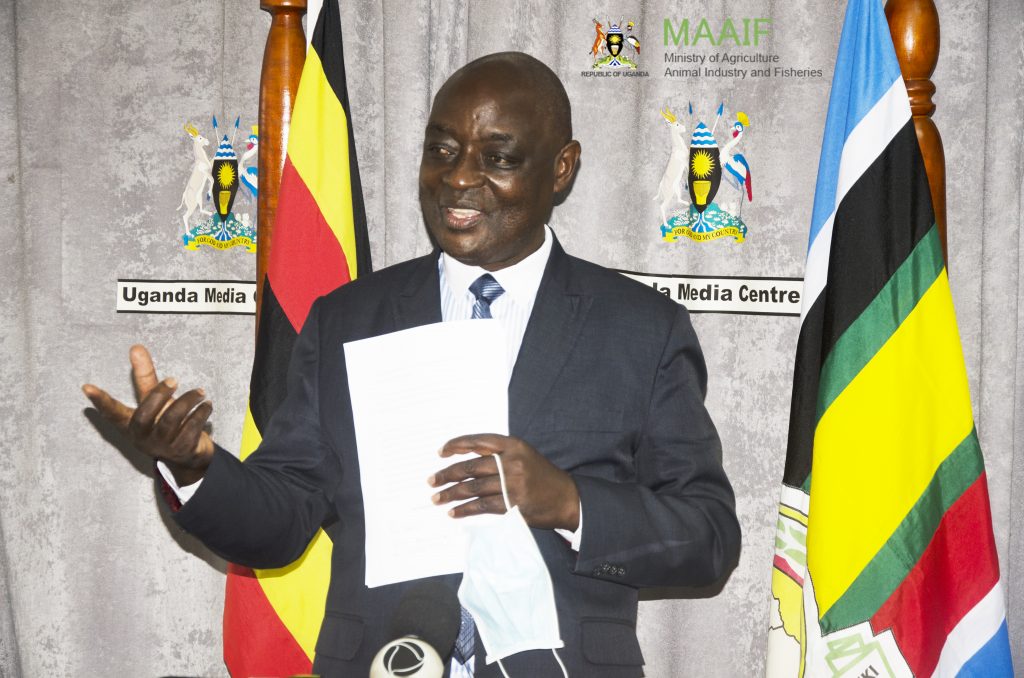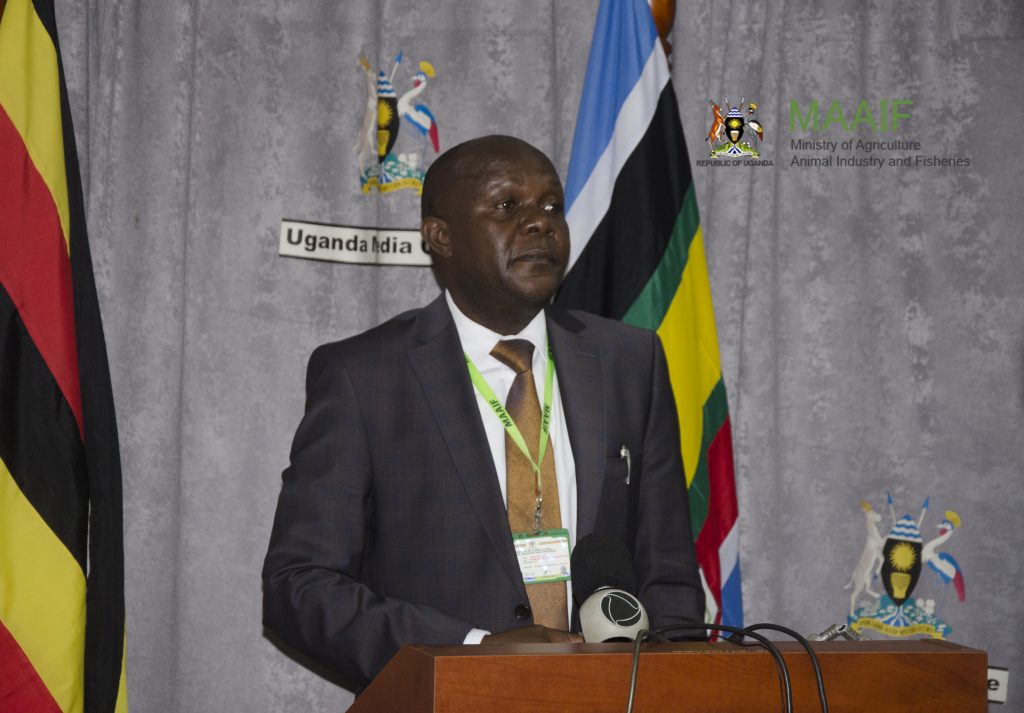
Official declaration of Harvest Dates for Vanilla
Kampala, 4th December 2020. The Honourable Vincent Bamulangaki Ssempijja the Minister for Agriculture, Animal Industry and Fisheries presented an official declaration of harvest dates for Vanilla.
Below is an excerpt of the official statement.
Vanilla is one of the high value crops grown in over 25 Districts of Uganda, mainly in Central, Eastern and Western regions.
Vanilla is a spice used to add flavor to food, beverages, in cosmetics and can also be used in pharmaceutical industries.
Vanilla has proved to be a sustainable and profitable crop for farmers. Vanilla is the single crop in Uganda with the highest price per kilogram. For instance, prices reached as high as Uganda Shillings 250,000= in July 2018 for green vanilla beans at the farm-gate. Although currently vanilla prices are low due to the international market challenges, Vanilla is still a very good crop for our farmers. Today, vanilla is selling at a much higher price than any other commercial crop grown in Uganda and we expect prices to rise again in 2021.
Despite its importance and huge potential to get our vanilla farmers, processors and buyers out of poverty, vanilla value chain is still experiencing several challenges which threaten the survival of the industry. The key challenge is maintaining the Vanilla Quality required at the International market.
Vanilla Quality is compromised by Immature Vanilla Harvesting, Poor handling, Processing and Storage. Low Vanilla quality is resented by International Vanilla Buyers. This affects all the stakeholders along the entire value chain: the Farmers, Processors, Exporters and Uganda as a Country. Profits decline and as a country, our vanilla becomes less competitive in the market.
Poor quality vanilla is largely orchestrated by theft and undercover processing activities such as roasting, burying underground and informal trade.
As a country, we have a great opportunity to harness a growing long-term profitable vanilla industry. Vanilla has proved to be a sustainable and profitable crop for farmers in Uganda with potential to deliver the participating farmers and actors into the medium income status cherished by the NRM Government.
Government is collaborating with partners like Catholic Relief Services, Private sector organizations like VANEX, vanilla farmers and processors promoting the development of vanilla value chain in Uganda, to address the vanilla challenges in the country. Local Governments where vanilla is grown have also risen up to tackle the vices. We have adopted best practices from other vanilla producing countries that experience similar challenges and we have started receiving encouraging reports from International buyers regarding the quality of vanilla that we export. We need to scale out such achievements until Uganda emerges as number one source for the best vanilla in the world.
For the past two years, the Ministry of Agriculture, Animal Industry and Fisheries has declared vanilla harvest dates in a bid to improve the quality of the crop and promote Uganda’s global position as the leading source of high quality vanilla.
Declaration of Harvest dates by Government has paid dividends. So far, the quality and the overall image of Uganda’s vanilla industry has, reportedly improved. This is evidenced by positive testimonies from the Global Vanilla Buying Community, organized under the Sustainable Vanilla Initiative.
Declaring and respecting vanilla harvest dates is crucial. The reason is that for vanilla to achieve the flavor preferred by buyers on the international market, it must be harvested only when it is mature. In difficult economic times being experienced globally, due to COVID 19 pandemic and as supply meets or even exceeds demand, it is expected that international buyers will place more stringent quality requirements on suppliers. Therefore, if premature selling and buying of vanilla continues, there is a possibility of international buyers turning their backs on Ugandan vanilla.
Protecting the quality of Uganda vanilla is critical for Uganda. I wish to emphasize that the theft and early selling of immature vanilla is harmful to the reputation of Ugandan vanilla on the global market and it leads to lower income for farmers.
I wish to further guide that farmers should harvest their vanilla when fully mature and ripe. Simultaneously, traders and processors must ensure professional handling and processing of vanilla to attain the highest possible vanillin content.
If we can work together to address practices that reduce the quality of vanilla, we will be in a stronger position to protect our farmers from the price fluctuations on the worldwide vanilla market and Uganda will become a number one supplier of the high quality vanilla in the world.
I hereby declare that the appropriate vanilla harvest date for the second season of the year 2020 shall be the 11th of January 2021 onwards. Farmers should remember to only pick ripe vanilla beans. The Government of Uganda will take strong punitive action against anyone found harvesting, or in possession of vanilla beans before the stipulated date.
I am directing my Ministry staff to be vigilant on this issue, especially the Agricultural Police, in collaboration with the Private Sector who are called upon to popularize these harvest dates, to hunt down and expose all culprits who do not respect them.

Notes for editors
About the Ministry of Agriculture, Animal Industry and Fisheries (MAAIF)
The Ministry of Agriculture, Animal Industry and Fisheries is a Ministry in the Government of Uganda charged with creating an enabling environment in the Agricultural Sector.
The Ministry formulates, reviews and implement national policies, plans, strategies, regulations and standards and enforce laws, regulations and standards along the value chain of crops, livestock and fisheries.
Vision: A competitive, profitable and sustainable agricultural sector.
Mission: To transform subsistence farming to commercial agriculture.
Strategic Objectives
- To initiate the formulation and review of the policy and legal framework for the sector
- To establish and implement systems for service provision in the sector
- To strengthen and implement strategies, regulatory framework, standards, institutional structures and infrastructure for quality assurance and increased quantities of agricultural products to access and sustain local, regional and export markets
- To design and implement sustainable capacity building programmes for stakeholders in the agricultural sector through training, re-tooling, infrastructure, provision of logistics and ICT
- To develop strategies for sustainable food security
- To develop appropriate agricultural technologies for improved agricultural production, productivity and value addition through research
- To develop effective collaborative mechanisms with affiliated institutions and
- To take lead and establish a system and institutional framework for agricultural data collection, analyses, storage and dissemination to stakeholders including Uganda Bureau of Statistics.
The Ministry of Agriculture, Animal Industry and Fisheries (MAAIF) is made up of four Directorates including the Directorate of Crop Resources, Directorate of Animal Resources, Directorate of Agricultural Extension Services and the Directorate of Fisheries Resources each with Departments, Divisions and Partnership Projects.
The Departments of the Ministry which do not fall directly in the above include the Department of Agricultural Planning and Development, the Human Resource Department, the Department of Finance and Administration and the Department of Agricultural Infrastructure, Mechanisation and Water for Agricultural Production.
The Ministry is also made up of seven Agencies including the National Agricultural Research Organisation (NARO), the National Agricultural Advisory Services (NAADS), Cotton Development Organisation (CDO), Dairy Development Authority (DDA), Uganda Coffee Development Authority (UCDA) and Coordinating Office for the Control of Trypanosomiasis in Uganda (COCTU) and the National Animal Genetic Resources Centre and Databank (NAGRC&DB).
